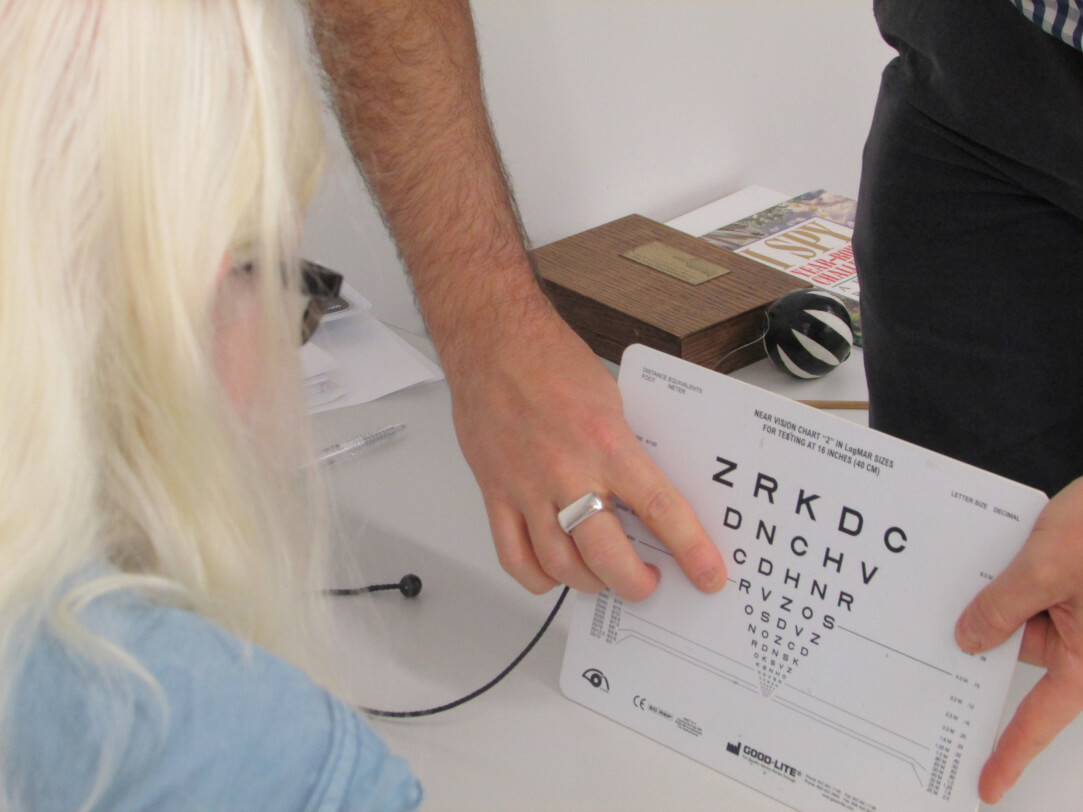Assessment Service
Do you sometimes wish you knew just how well your child was using their vision? How well are they developing? What can they see? What are their overall needs and what type of resource would be appropriate to meet those needs? If so, you may find that the Assessment Service at Homai Campus can help you in many ways.

What is the Assessment Service?
The service offers a comprehensive assessment of your child’s current developmental status. You and your child will meet with each member of a team of educational and health professionals who have training and experience in the field of vision impairment as well as in additional special needs. The aim is to provide families and teaching teams with accurate, up-to-date information to support educational planning and school placement.
This service is available for children of all ages (from birth to 21 years) from all parts of New Zealand. Parents are provided with a detailed report and recommendations following the assessment.
Learn more about our Assessment Service
Learn more about our Assessment Service through our short video. Included is an audio description of the film and transcript of the audio description to provide context.
Assessment Service film description (audio)
Assessment Service film
Assessment Service film
Where does the assessment take place?
Most assessments take place at BLENNZ Homai Campus in Auckland. However, the Assessment Team also makes visits to other regions throughout NZ where the members work alongside local professionals.
Who are the Educational Assessment Team?
The Ophthalmologist (Eye Doctor)
The ophthalmologist undertakes a comprehensive examination of your child's eyes and offers medical and diagnostic information and advice to families, caregivers and teaching teams.
The Optometrist
The optometrist assesses the need for glasses or low vision aids and offers advice and information to parents, caregivers and teachers.
The Speech and Language Therapist
The speech and language therapist assesses and makes recommendations for improved communication and feeding skills.
The Paediatrician
The paediatrician undertakes a comprehensive medical check of your child, offering advice to parents and caregivers, and when necessary, an opinion on diagnosis and treatment.
A Chance to Chat
The session with the Educational Psychologist is an opportunity to discuss and gain information about well being, social & emotional development, building resilience, family/whānau relationships, behaviour management, planning for transition and change and family and student support entitlements.
The Functional Sensory Teacher
The functional sensory teacher undertakes functional vision assessment/observation, functional tactual observation, and functional auditory observation. The functional sensory teacher may assess how your child uses vision, touch, and/or hearing, to gather and process information during every day activities. Suggestions for assisting with accessibility, environmental adaptations, appropriate equipment, and special format materials are provided.
Adaptive Daily Living Skills Specialist (ADL)
The adaptive daily living skills specialist assesses motor and learning skills for self-care, leisure and daily living, and suggests programme activities for further development, encouraging independence and safety.
Strategies & Tools for Learning Teacher
The strategies and tools for learning teacher considers the child, environments, required learning tasks, and provides recommendations for accessing the curriculum and strategies for learning tasks.
The Physiotherapist
The physiotherapist will guide parents and caregivers in suitable handling, positioning and movement techniques and advise on equipment and ways to increase the strength and independence of your child.
The Orientation & Mobility Specialist (O&M)
The O&M specialist focuses on optimising purposeful, safe movement, and the development of efficient sensory skills for travel in a range of environments.
The Music Therapist
The music therapist uses sound and music to assess functional, emotional, musical and creative abilities and needs.
Frequently asked questions
How long does the Assessment take?
Families usually arrive by Sunday afternoon and return home by Tuesday afternoon or depending on circumstances Wednesday afternoon. Assessments are timetabled to take place on Monday and Tuesday.
Who should attend the Assessment?
Parents/caregivers are invited to attend and to accompany their child to each assessment. The child's classroom teacher, teacher aide, Resource Teacher Vision, a social worker or someone else chosen by the parents to advocate for their child's needs may attend. Travel funding is provided for one adult and one child.
How do we get there?
We will liaise with you and arrange your travel bookings.
What should parents bring?
Meals and accommodation are provided at the Homai Campus. Linen is provided and there are laundry facilities available. Parents are welcome to use the Centre's facilities including the heated indoor pool. Please include the child's favourite toys and any special seating or standing equipment if possible. You will be sent a DVD showing the Assessment Process and the Centre's facilities
Who may apply to the Service?
Any person who is close to the learner may apply. This may be:
- A parent or family member
- Resource Teacher Vision
- Teacher or Principal of your child's school
- A social worker or advisor from the Blind Foundation
- An ophthalmologist or paediatrician.
Who pays for the assessment?
Currently there is no cost for this service. Travel and accommodation, (up to 4 days, 3 nights), is provided free of charge for families (1 adult and 1 child) travelling from out of Auckland. Other family members are welcome to attend but additional flight costs are at the expense of the family. Meals during the assessment week are provided for all families and special dietary requirements are provided by arrangement.
For further information or a referral form for a full national assessment please contact:
The Coordinator
National Assessment Service
BLENNZ, Homai Campus
Private Bag 801
Manurewa
Auckland 2243
Tel: (09) 266 7109
Email: assessment@blennz.school.nz